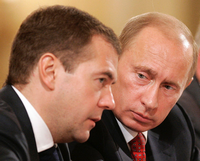As Russia begins its countdown to elections for the Duma at the end of this year as well as the presidential ballot in early 2012, two predictions are making the rounds. The first is that Prime Minister Vladimir Putin will reclaim the presidency, which the constitution required him to vacate in 2008. (Article 81.3 prohibits anyone from holding the office for more than two consecutive terms.) The second is that the "tandem" formed by Putin and current President Dmitry Medvedev, Putin's former chief of staff, is not sustainable and that an open break between the two will occur sooner or later.
Events may prove me wrong, but I believe that in this case, the conventional wisdom is mistaken: Putin will not run for president again in 2012, and rumors of an impending split between Putin and Medvedev have been greatly exaggerated.
Those who argue that Putin is aching to return to the presidency often overlook a critical shift that has taken place over the last two years: The office of the prime minister is no longer a subordinate role. It was very true that during the Yeltsin and Putin administrations, the prime minister was clearly subordinate to the president. But when Putin became prime minister in 2008, he used public comments to unofficially redefine and rebalance the relationship, saying, "The president is the guarantor of the constitution and sets the main domestic and foreign policy guidelines. But the highest executive power in the land lies with the government . . . "

